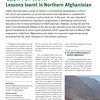Cash For Work - Lessons learnt in Northern Afghanistan
The results of the field study conducted in the BMZ funded and GTZ implemented DETA project in Northern Afghanistan, largely tallied with other findings about cash based approaches. CFW was seen as a valid rapid response tool with a potential as an effective mechanism for triggering longer-term motivational and value changes in traditional Afghan communities. Whether cash transfers are appropriate as a replacement or complement to flank in-kind support, can only be decided on a case-by-case basis within specific contexts. Reservations about the feasibility of cash relating to security, corruption and gender risks were not seen in practice. No evidence was found of a discernable anti-social use of cash, higher security risks in handling cash versus in-kind help, more extensive corruption or cash disbursals or that cash particularly disadvantaged women. The field study ultimately arrives at the conclusion that better co-ordination among actors at national level is needed. The large number of agencies engaged in CFW programmes in Afghanistan renders co-ordination and exchange of experience particularly vital.
Paul Harvey
paul.harvey@humanitarianoutcomes.org
Overseas Development Institute
London, United Kingdom
Nicolas Lamadé
Nicolas.Lamade@gtz.de
Deutsche Gesellschaft für Technische Zusammenarbeit (GTZ)
Eschborn, Germany
Dr Hannelore Börgel
Boergel.Hannelore@t-online.de
Consultant - Berlin, Germany




